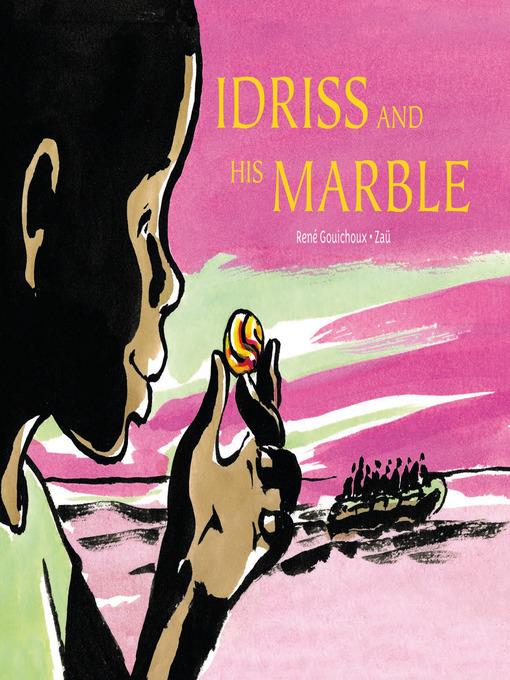
Idriss and His Marble
کتاب های مرتبط
- اطلاعات
- نقد و بررسی
- دیدگاه کاربران
نقد و بررسی

June 10, 2019
This refugee story for younger readers follows Idriss, a boy of color who lives in a place where the ground is dry and sandy and the buildings are low and flat-roofed. He doesn’t know just why he and his mother must leave and find a new place to live, but it has to do with the “CRACKS and BOOMS” he can hear outside, where “whispers turn to shouting.” Loose ink wash and earth-toned spreads by Zaü (Hazelnut Days) underscore the length of their journey as Idriss and his mother walk, ride, cross under barbed wire (“His mother is so graceful, weaving their bodies beneath the barbed wire as if she were dancing”), and board a boat. Throughout, Idriss holds on to his precious marble. Gouichoux (I Am Ivan Crocodile!) focuses on the way Idriss treasures his small, beautiful object, which he calls lucky; he clings to it, almost loses it, then gets it back. Readers will quickly grasp how caring for his precious possession is what sustains him in his flight across borders. And when Idriss reaches his new home, his marble is his passport to a new life and a new language. Ages 8–9.

July 15, 2019
Idriss, who comes from an unidentified African country, loves his marble. One day, there is an explosion and people start fighting. The unrest continues, and his mother decides it is too dangerous for them to stay. Idriss and his mother leave their village. Dramatic illustrations with strong, brushy black outlines and daubs of color portray their struggle. Mother and son endure a tenuous journey, walking through the desert, riding on crowded buses, crawling beneath barbed wire, and finally getting on a flimsy boat to cross the sea. Along the way, Idriss hangs on tight to his marble, protecting the only thing he took with him from home. The precious marble almost gets lost, as does the dream of reaching safety, but the family is very lucky. As an object of affection to a young child, the marble plays an important role in fostering connections among people--both on the road and at Idriss' new home, which is likely in Europe. The story portrays some reasons why people could become refugees and the struggles they may experience while seeking refuge. However, the combination of artistic choices--the outsized preciousness of the single marble, the stark, impoverished landscape of Idriss' village, the easy authority of a new white friend, and Idriss' lack of linguistic skills, among others--does not disrupt stereotypes about Africa. This doubtless well-intentioned story about refugees unfortunately reinforces a primitive image of Africa and its peoples. (Picture book. 6-10)
COPYRIGHT(2019) Kirkus Reviews, ALL RIGHTS RESERVED.

August 1, 2019
Grades 2-4 This joins the corpus of recent publications about war's traumatizing effect on children. Here we meet Idriss, who lives?judging by the illustrations?in an African village. As the title implies, he has just one precious marble, and readers are invited to empathize with the delight he finds in playing with it. When violence threatens his village, Idriss and his mother flee, and the story shifts focus to let us see their resilience and hope in the face of their precarious lives. Whereas the narrative is tender and lyrical, Za�'s illustrations offer a striking contrast. Washes of watercolor in ochre and rose capture the bright desert heat while figures, shadows, and movement are rendered in sweeps of solid black ink. The intention, as with the marble itself, is to emphasize the simultaneous fragility and solidity of childhood, life, and the places we think of as home. Poignant, beautiful, and timely, this can be paired thematically with Marsha Forchuk Skrypuch's Adrift at Sea (2016) and Wendy Meddour's Lubna and Pebble (2019).(Reprinted with permission of Booklist, copyright 2019, American Library Association.)

























دیدگاه کاربران